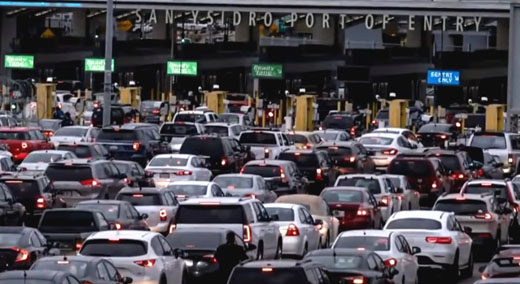WorldTribune, April 14, 2020
By Judicial Watch
The U.S. government has ordered Americans to avoid international travel due to the coronavirus pandemic and the State Department has specifically “restricted” transit between the U.S. and Mexico, yet southern border crossings are hotbeds of traffic that are jeopardizing the health of federal agents charged with screening the influx.

U.S. Customs and Border Protection (CBP) sources tell Judicial Watch that thousands in border states, especially Arizona, are taking daily jaunts to Mexico to have lunch (yes, many restaurants are open there), shop and visit family.
“It’s crazy,” said veteran CBP agent Patricia Cramer, who also serves as president of the Arizona chapter of the agency’s employee union. “U.S. citizens and residents are crossing freely into Mexico for non-essential activities like lunch, dinner or a haircut,” Cramer says agents are telling her. Many return to the U.S. the same day, creating a gridlock that must be screened by CBP officers.
In some Mexican border towns, such as Sonora, there is no coronavirus monitoring, U.S. federal agents say, and the area is wide open for all sorts of business.
In San Luis it is a bit stricter, but restaurants are still open. Hordes of Americans are escaping the virus restrictions by going to Mexico, according to federal agents on the front line. Under COVID-19 protocols Mexican nationals are not allowed to go back and forth via land crossings for non-essential travel, but those with legal U.S. residency (green cards) and citizens cannot be stopped.
Cramer and her fellow agents are calling on elected officials to help curb the non-essential cross border traffic. “The hundreds of cars in line to get across the border around noon, that’s people going to get tacos, haircuts, groceries or family visits,” Cramer said, a fact that she assures CBP officers have confirmed.
Cramer as well as many of her CBP colleagues believe the Trump administration has not stopped the leisurely cross-border traffic that clearly violates the government’s COVID-19 directive because it prioritizes facilitating travel.
“They’re not protecting us on the frontline,” according to one agency veteran. Cramer reminds that agents must come into contact with every single person that enters the country. “Citizens and green-card holders are not taking this virus or the lockdown orders seriously,” Cramer said, adding that they are exposing front line officers and entire communities. CPB has more than 60,000 employees and the agency is charged with keeping terrorists and their weapons out of the U.S. while facilitating lawful international travel and trade.
Just last week the agency issued a directive reminding the public that travel restrictions remain in place. “CBP officers and agriculture specialists continue securing the borders, facilitating trade and processing essential travel.”
The mandate offers a link to a Department of Homeland Security (DHS) announcement published in the Federal Register that outlines temporary travel restrictions implemented for land ports of entry and ferries between the U.S. and Mexico during the pandemic. The document states that the risk of continued transmission and spread of COVID-19 between the U.S. and Mexico poses a “specific threat to human life or national interests” and therefore officials in both countries have mutually determined that non-essential travel between the nations “poses additional risk of transmission and spread of COVID-19.” Essential travel is defined as American citizens and lawful residents returning to the U.S., medical purposes, military or diplomatic duties and lawful cross-border trade.
Additionally, the State Department issued a Global Level 4 Health Advisory instructing U.S. citizens to avoid all international travel due to the global impact of COVID-19.
The U.S. Embassy and Consulate in Mexico specifically warned the virus poses a real health risk to both travelers and those who receive them. “Mexican states have instituted health checks that could result in U.S. citizens being returned to the United States or placed in mandatory quarantine,” the State Department writes. “For these reasons, and for the health and safety of citizens on both sides of the U.S.-Mexico border, we urge U.S. citizens planning to visit family and friends in Mexico to stay home and postpone any other non-essential travel.”
The U.S. Consul General in Nuevo Laredo, Kathryn Flachsbart, also recorded a video in Spanish that has been widely distributed on social media and in Mexican news outlets. In the short segment Flachsbart says that travel between the U.S. and Mexico is currently restricted and warns that U.S. citizens may be detained or held in quarantine in Mexico. “We ask that you stay home and avoid travel unless it is absolutely essential,” she says, adding that “if you live in the U.S. you should plan to stay in Mexico for an indefinite period if you travel to Mexico.”
Intelligence Brief __________ Replace The Media
